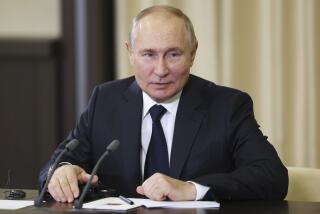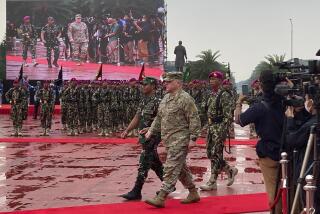Top U.S. Military Officer Visits China’s Space Program Center
- Share via
BEIJING — Air Force Gen. Richard B. Myers, chairman of the Joint Chiefs of Staff, made a rare visit Wednesday to the command center of China’s secretive space program amid signs that U.S.-Chinese relations have thawed, even as the two nations begin a rivalry in space.
Myers’ visit was aimed largely at advancing cooperation on Taiwan, which China views as a renegade province, and moving forward with six-party talks on containing North Korea’s nuclear threat.
But the space center tour, a previously unannounced meeting today with former President Jiang Zemin and the announcement of a visit to Washington this year by China’s military chief of general staff drew intense interest from Chinese media and political and military observers.
Visiting the massive television-lined Beijing Aerospace Command Center, which bears a striking resemblance to the U.S. facility in Houston, Myers watched a video on China’s first manned space flight in October, the 21-hour mission of Lt. Col. Yang Liwei aboard the Shenzhou 5 spacecraft.
The tour, which the top U.S. uniformed military officer had requested, was limited to viewing photos, a mock-up of the space craft in the foyer and the video presentation in the mission control room.
“Congratulations on China’s first manned space flight!” Myers wrote in a guest book after the tour. “The whole world watched and was very happy this flight was so successful. I wish you much success in the future.”
As commander of the North American Aerospace Defense Command until 2000, Myers was responsible for defending the United States through space and intercontinental ballistic missile operations.
To one side of the center’s massive screens hung a vertical banner that read, “Achieve the Chinese people’s dream of soaring through the heavens.” On the other side another banner read, “Realize the complete success of the first manned space mission.”
Yang’s journey made China the third country to put a man into space. A Chinese narrator boasted that the Chinese space capsule was better than U.S. or Russian equipment.
Hours after Myers finished his 40-minute tour, President Bush ratcheted up the competition in space, asking Congress for an extra $1 billion for NASA over five years to launch a program that would put a permanent base on the moon and land astronauts on Mars.
China’s program has recovered from setbacks, and officials say they are aiming for the moon. Some 30 taikonauts, as the Chinese astronauts are called, are training outside Beijing.
“The successful launch of Shenzhou 5 not only boosted national pride but injected confidence into the research of the next spacecraft,” the Communist Party’s newspaper, People’s Daily, quoted Huang Chunping, general director of Shenzhou 5, as saying.
More to Read
Sign up for Essential California
The most important California stories and recommendations in your inbox every morning.
You may occasionally receive promotional content from the Los Angeles Times.











